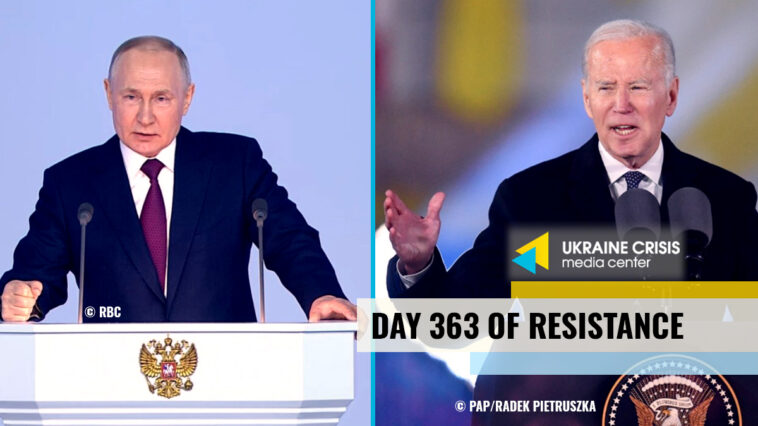Putin delivers state of nation address
In his address to the Federal Assembly on February 21, Russian President Vladimir Putin blamed the West for starting the war in Ukraine, and vowed to continue it.
Putin began his address by saying he is speaking “in a difficult, watershed moment for our country.” Russia will decide the tasks it faces step by step, carefully, and consistently, he said.
Putin accused Western nations and Ukraine of “lies”, “colonialism”, and “neoliberal totalitarian values”. He said he was forced to invade Ukraine after Western nations ignored key Russian security concerns.
“They started the war, and we are using force to stop it,” the Russian President said.
He once again speculated about history, accusing Austria-Hungary and Poland of wanting to cut Ukraine’s “historic land” off from Russia in the 19th century.
Putin made similar statements in his previous addresses. He also said that Russia “is not fighting against the people of Ukraine” that is “occupied” by the West.
Russian forces shell Kherson as Putin speaks
In the afternoon on Tuesday, the Russian forces launched a massive artillery strike on Kherson, using multiple launch rocket systems. At least five people were killed, and 16 more wounded. Four of the victims were killed at a bus stop.
A Russian strike hit a public transport stop, blood center, and apartment buildings. Shops, power lines, and vehicles were damaged.
Ukrainian President Volodymyr Zelenskyi said: “The Russian army is heavily shelling Kherson. It is again mercilessly killing the civilian population.”
“A vehicle park, residential areas, a high-rise building, and a public transport stop were hit. Unfortunately, these terrorist attacks caused casualties. My condolences to everyone who lost loved ones,” Zelenskyi said.
“The world must not forget for a single moment that Russian cruelty and aggression know no bounds. The terrorist state will be held to account for inhuman crimes against our people and the state of Ukraine,” Zelenskyi said.
Biden delivers a speech in Warsaw
U.S. President Joe Biden, in a speech in Warsaw on February 21, said Russian President Vladimir Putin miscalculated in invading Ukraine.
“When President Putin ordered his tanks to roll into Ukraine, he thought we would roll over. He was wrong. The Ukrainian people are too brave. America, Europe, a coalition of nations from the Atlantic to the Pacific — we were too unified. Democracy was too strong,” Biden said.
“Instead of an easy victory he perceived and predicted, Putin left with burnt-out tanks and Russia’s forces in disarray,” he said.
“He thought he’d get the Finlandization of NATO. Instead, he got the NATOization of Finland — and Sweden. He thought NATO would fracture and divide. Instead, NATO is more united and more unified than ever before,” the U.S. President said.
Putin found himself at war with a nation led by a man whose courage would be forged in fire and steel: President Zelenskyi, Biden said. Allies’ support for Ukraine will not waver, he reassured. “Ukraine will never be a victory for Russia,” Biden stated.
“One year ago, the world was bracing for the fall of Kyiv. Well, I have just come from a visit to Kyiv, and I can report: Kyiv stands strong! Kyiv stands proud. It stands tall. And most important, it stands free,” the U.S. President said.
Biden directly addressed the Russian people at one point. “The United States and the nations of Europe do not seek to control or destroy Russia. The West was not plotting to attack Russia, as Putin said today,” the U.S. President said.
Social psychology during the war. Ukraine in Flames #348
We live in a terrible, cruel and unpredictable time of war. As a society we experience emotional ups and downs, and that is completely normal. Nevertheless our emotional state is a reliance and resource that allows us to take care of ourselves and people around us. Watch Ukraine in flames #348 to find out about mood swings and conflicting emotions during the war, and how Ukrainians have built up psychological resilience during this turbulent year.
Guests:
- Lidiya Smola, Doctor of Political Sciences, Professor of the NTU “KPI”, Expert in Information Influence and Social Communications
- Liudmyla Prosandeeva, Doctor of Psychological Sciences, Professor, Head of the Social and Psychological Center of KNUCA




